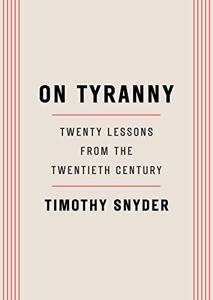
Want to learn the ideas in On Tyranny better than ever? Read the world’s #1 book summary of On Tyranny by Timothy Snyder here.
Read a brief 1-Page Summary or watch video summaries curated by our expert team. Note: this book guide is not affiliated with or endorsed by the publisher or author, and we always encourage you to purchase and read the full book.
Video Summaries of On Tyranny
We’ve scoured the Internet for the very best videos on On Tyranny, from high-quality videos summaries to interviews or commentary by Timothy Snyder.
1-Page Summary of On Tyranny
Overall Summary
Prologue
Snyder begins with an epigraph from the Polish philosopher Leszek Kołakowski: “In politics, being deceived is no excuse.” He believes that history can help people learn how to avoid tyranny. Snyder examines history in 2017 because he too fears that America could fall into tyranny.
The United States was founded on the principles of democracy, but it has been a long time since then. Snyder will look at what went right and wrong with European democracies that were founded after World War I, World War II, and the collapse of communism in 1989. He’ll also make suggestions for how America can avoid going down the same path as those countries.
Chapter 1
Throughout history, people have followed their leaders without question. For example, when Adolf Hitler was elected in 1933, the German citizens supported him and his policies. Similarly, when Hitler planned to invade Austria in 1938 (Anschluss), the Austrian government simply agreed because they were afraid of Nazi retaliation. The Austrians started persecuting Jews before the Nazis even took over; this is why later genocidal policies by the Nazis were modeled after those of Austrians. Stanley Milgram conducted an experiment that showed how people are more willing than they think to commit violence if ordered by authority figures like police officers or military personnel.
Chapter 2
Snyder says that institutions don’t protect themselves. After Hitler was elected, the German people thought that Germany’s democratic institutions would stop him from implementing his anti-Semitic policies, but they didn’t. Less than a year after being elected, he banned all other parties and weakened every institution in Germany to do what he wanted.
Chapter 3
People should fight against parties that try to consolidate power. The famous quote “eternal vigilance is the price of liberty” was actually said by Wendell Phillips, an abolitionist activist who wanted to point out how dangerous it is when Americans get too powerful and try to take over their own country.
In the last century, European democracies were taken over by one party. Nobody knows when they’re voting in their last election because that’s how it happened before. The United States is becoming an oligarchy, ruled by the wealthy and a minority party with no popular support. This year’s presidential election could be its last truly free one if we don’t reform our electoral system soon.
Chapter 4
People must confront and remove symbols of hate, like swastikas. For instance, in the 1930s, the Soviet government caricatured wealthy farmers as pigs to justify expropriating their land and killing them. Similarly, by marking shops with symbols that meant their owners were Jewish, the Nazis taught Germans to see Jews as economic and political enemies to be eliminated.
It’s great to express your nationalism but make sure it doesn’t offend the people around you. You may do it out of anxiety or fear, but that can create a problem. The Czech writer Václav Havel told about how he remembers seeing grocery store owners in communist countries put up pro-communist signs just so they could avoid trouble from the government.
Chapter 5
When politicians demand that professionals obey, they must insist on acting ethically. Governments can apply pressure to make professionals abandon their ethical standards and become active participants in violence. This happened during Hitler’s reign when lawyers were involved in his plans for war and genocide, doctors performed experiments on prisoners, and business leaders profited from forced labor.





